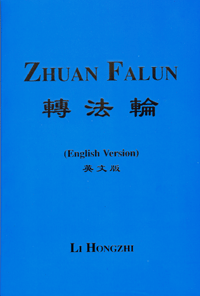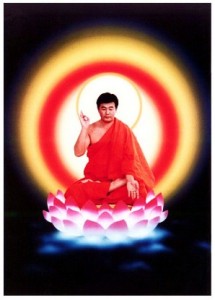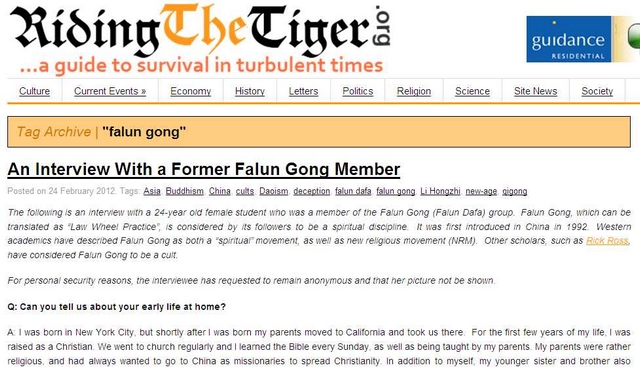The following is an interview with a 24-year old female student who was a member of the Falun Gong (Falun Dafa) group. Falun Gong, which can be translated as "Law Wheel Practice", is considered by its followers to be a spiritual discipline. It was first introduced in China in 1992. Western academics have described Falun Gong as both a "spiritual" movement, as well as new religious movement (NRM). Other scholars, such as Rick Alan Ross, have considered Falun Gong to be a cult.
For personal security reasons, the interviewee has requested to remain anonymous and that her picture not be shown.
Q: Can you tell us about your early life at home?
A: I was born in New York City, but shortly after I was born my parents moved to California and took us there. For the first few years of my life, I was raised as a Christian. We went to church regularly and I learned the Bible every Sunday, as well as being taught by my parents. My parents were rather religious, and had always wanted to go to China as missionaries to spread Christianity. In addition to myself, my younger sister and brother also attended church with the rest of us. I generally consider my childhood to have been happy. My parents were hard-working, and I enjoyed the company of my siblings.
In 2001 my maternal grandmother came to live with us. She was a Buddhist and usually did not go to church with us, but she respected our religion and said that when it comes to religion, people should just try to be the best person they could be.
Q: How did you first learn of Falun Gong?
A: In 2004, my parents "discovered" Falun Gong after reading pamphlets in a Chinese grocery store. At this point I was also becoming more aware of my Chinese heritage, and so I thought to myself "why not?" and I also embraced Falun Gong as merely a type of exercise. I was unaware of the political situation behind Falun Gong at the time. I just wanted to learn about my roots and because they advertised this as something which as part of our Chinese culture, I decided to try and become more involved.
Q: Can you recall some early experiences that lead you to question Falun Gong?
A: To make a long story short, the first time I had questions about Falun Gong was when younger sister had the flu, and they would not allow her to take medicine. She was only three years old at the time! At this point my parents and I had already read Zhuan Falun, and I was convinced that my sister's illness was related to not being sincere enough. In fact, I had stayed home from school for days at a time to engage in what Falun Gong calls "sending forth righteous thoughts". As a result, my grades suffered. Before, I had been an honor student and had been among the top five students in my school. After this, I fell down to being a very poor student and nearly flunked one semester. My teachers became genuinely concerned and asked me what was wrong, but at the time I didn't tell them.
It was likely that this left a big effect on me, and I tried to focus more on my studies. However, I didn't leave Falun Gong since I was still at my parent's house. They were very devoted to it and I felt that they would punish me if I went back to church.

The Central book of Falun Gong, "Zhuan Falun" : A compendium of vapid mock spirituality composed of a bland pastiche of 'Eastern' occult doctrines.
Q: So your parents didn't go to church after getting involved with Falun Gong?
No. In fact, they told me it was not useful because Li Hongzhi had once said that all different races have different heavens. Hence, they abandoned being Christians. Some people think you can be a Falun Gong practitioner and a Christian. My own experience in my house told me that this is impossible. They try to get you "in" by telling you it's just exercise and qigong but you don't learn about it being a religion, and you won't learn that "Master" Li Hongzhi is really the savior of the world until much later.
Also one very strange thing is that my parents became very paranoid of other people. The Church we had attended was mainly a Chinese-American church. Every Sunday, there were three services given by three pastors in Cantonese, Mandarin and English. My parents even tried to accuse the Mandarin-speaking pastor, who was a very good man from Taiwan, of being someone who persecutes Falun Gong and works with the Chinese government. I was truly stunned. This man was the guy who was a devout Christian, a Taiwanese-American who had never set foot in mainland China. He was the last person anybody could call a persecutor of anybody, much less some sort of agent of a communist government.
Q: Since you mentioned politics, what was your opinion of the political situation back then, and what's your opinion of it now?
When I was still a member of this cult, I read a lot of persecution stories about the members in China. I understand now that some may have been exaggerated so that we could develop an "us-vs-them" mentality. And it was also used in some way to legitimize us. Since we were told that the Chinese government was evil, how could we, the victims be wrong? This is actually a well-developed trick. Just look at the Israelis – since the Nazis persecuted them, they tell people they can never be wrong. I think the Falun Gong's logic was much in the same spirit, applied back to religion.
I think you might have read about Sujiatun in the papers. Well after that report came out, Harry Wu, a famous dissident felt that the evidence was insubstantial. American officials also investigated the hospital and found no evidence that it was being used for organ harvesting or detaining prisoners. Only two Canadian researchers, out of everyone in the world, found "evidence," which was mainly gathered by people who reported to be there.
Of course there are still political problems. Although I'm not involved with Falun Gong any longer, people still have the right to practice what they wish, even if someone else views it as wrong. However I do not necessarily think that many of them are political. Even ordinary Chinese people who don't have any affiliation to Falun Gong are sometimes imprisoned by the government.
Q: You stated that you started to question Falun Gong after your schoolwork suffered. Can you say what happened after that?
A: I actually was a Falun Gong "practitioner" until I entered University. At that time I had been involved fully with a lot of its activities. I honestly thought that Falun Gong was teaching me 'Truthfulness, Benevolence and Forbearance'. Unfortunately because I wanted to achieve "consummation" by practicing Falun Gong, I graduated from high school with only slightly-above-average marks.
The University which I attended, surprisingly, had a Falun Gong organization, and to my surprise it was mostly populated by those of Caucasian descent. There were many other religious organizations, including other religious groups. Because of my contact with other students, I was able to talk about other religions. I remember when some Christians approached me. They were knowledgeable and respectful, but I felt angry every time they would criticize Falun Gong or the "Master". Similarly, when a Muslim student asked me if Li Hongzhi can die, I didn't respond directly but mocked him for being narrow-minded and obstinate. I often became angry at those who were critical of Falun Gong. I remember thinking that anyone who was against Falun Gong was evil. People at the Falun Gong organization also agreed. One boy even went as far to call non-practitioners "filthy demons" and said that it's okay if they are "destroyed". At that time, I was truly frightened and it lead to me doubting Falun Gong, but I was still afraid to leave.

Li Hongzhi is the omniscient and omnipotent savior of the world, according to himself and his followers.
Q: How long was it before you finally left?
A: I It took me many months to get the courage to leave Falun Gong. I think the final straw was when I went home one winter for vacation, I realized my grandmother was not well, so she needed to see a doctor. But my parents refused for her to have such treatment, since Li Hongzhi claimed that when you fell ill, neither injection nor medication was needed, you would recover simply by reading the book and doing some exercises. Unfortunately my grandmother's condition worsened, and although it was quite obvious that medicine was needed, my parents still adamantly refused. From that point forward, I decided to analytically look at Falun Gong better to realize its weaknesses.
Q: What steps did you take, once you finally decided to leave?
A: By the time I had realized Falun Gong was a cult, I felt the need to leave. I had realized that Falun Gong misuses terminology, and creates special meanings to words in order to fool people into thinking this is some kind of spiritual practice. So, I had already made my mind that I needed to get away somehow. I had to seek protection from the people who remained members. Also, although it was painful, I had to also stop communicating with my parents because they were still so fanatical about it.
Slowly, I was able to rebuild my life. During this time, I enrolled in some religion classes, and also read about 40 books in one year on the topic of religion. I started to learn more about various religions and investigated each one carefully by reading their books, and also third-person literature about them.
Q: How are your parents now? Are they still with Falun Gong?
A: Yes, they are still in the cult. It makes me quite sad to think about it every day. They were upset at me for leaving Falun Gong but I think that they are still good people inside.
Q: What progress have you made in spiritual or religious terms since then?
A: I am still deciding. I know I believe in law and order, but also in treating people with respect. Finding your path, and becoming a better person is a process which takes time. When you leave a cult you can't rush into the first thing you find. You should be perceptive and patient with yourself.
Right now, I know I believe in God. I'm taking that as the starting point, and I pray that He will help me through these troubles. In terms of a particular religion, I have not made up my mind. I do have a general idea of what I want: an authentic spirituality, a connection with something greater than myself, a sense of direction and morals. Isn't that what real faith is about? At this point I am leaning more towards Orthodox Christianity or Islam. Those are the two religions most appeal to me because their message is beautiful, clear and concise. I know it seems strange for a Chinese-American woman, raised in the United States, in this day and age to think about converting to Islam, but in fact I read a lot about Islam from both Islamic and secular sources, especially by writers like Ivan Aguéli, Réné Guénon, Hossein Nasr, Martin Lings and Titus Burckhardt, who converted to the religion. As far as Christianity was concerned, I also read a lot of books by Christian authors, like C.S. Lewis and [G. K.] Chesterton, and Seraphim Rose. I was actually raised as a Protestant, but after reading about Christian history and the Church Fathers, I feel that Orthodoxy is the "truer" version of Christianity.
Q: Do you have any concluding remarks?
A: I'm thankful for this opportunity to come here and talk about my experience. I reached a point back then, where I couldn't bear with the torment of the mind and conscience. I want to tell those who are involved with cults, not just Falun Gong, to try and evaluate things by themselves. I want to encourage them to think clearly, and to have the courage to leave if they feel threatened.

Original text from: http://www.ridingthetiger.org/tag/falun-gong/





